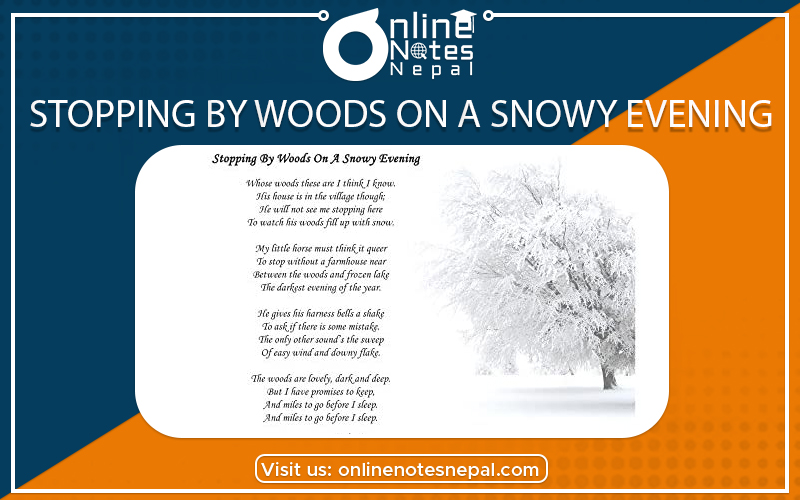Published by: Zaya
Published date: 06 Jul 2021

"Stopping by Woods on a Snowy Evening” is a poem by Robert Frost in which a speaker stops to watch the snow falling through the trees and consider the darkness.
Whose woods these are I think I know
His house is in the village though;
He will not see me stopping here
To watch his woods fill up with snow.
My little horse must think it queer
To stop without a farmhouse near
Between the woods and frozen lake
The darkest evening of the year
He gives the harness bells a shake
To ask if there is some mistake.
The only other sound's the sweep
Of easy wind and downy flake.
The woods are lovely, dark and deep,
But I have the promise to keep,
And miles to go before I sleep,
And miles to go before I sleep.
In this poem, the speaker is driving some kind of horse-drawn vehicle—perhaps a carriage or maybe even a sleigh—through the woods. He believes that he knows to whom this forested land belongs, but that man lives in the village. The speaker knows, therefore, that the owner will not even know that the speaker has stopped to watch the snowfall here.
Perhaps the driver delivers some kind of goods, as he claims that his horse probably thinks it is strange for them to stop out in the middle of nowhere rather than at a house, especially because it is so dark and cold; it is, in fact, the darkest night of the year, and from this, the reader can ascertain that it is the night of the winter solstice in late December. The horse shakes its harness, jingling its bells as if to ask if the driver has made some kind of mistake in stopping. Aside from the ringing of the bells, the wind softly blowing the downy flakes of snow is the only other sound—and, clearly, this would be a very, very quiet sound. It is nearly silent in these woods.
In the end, the speaker seems to express a strong desire to stay in the dark, tranquil, and silent forest, but he evidently feels compelled to keep moving because he has some kind of promise that he needs to keep. We do not know if he has more stops he must make, perhaps, or if he is expected to reach a certain place tonight. Whatever it is, this promise means that he must continue to travel a great deal further before he is able to stop and truly rest. The fact that the speaker repeats this final idea—that he has a long way to go before he can sleep—seems to indicate a good deal of regret that this is the case.